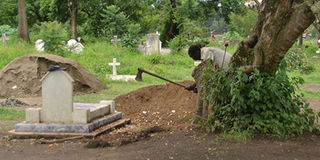Premium
Nakuru’s cemetery crisis worsens

A section of Nakuru North cemetery on July 3, 2018 which has filled up. PHOTO; AYUB MUIYURO/NAKURU
What you need to know:
- Burial space within key cemeteries, especially in Nakuru and Njoro towns, is running out.
- A spot-check at the Njoro cemetery revealed that getting fresh space was a big challenge.
- Limited space is left in Nakuru South and Gilgil cemeteries, making the county stare at a possible burial crisis.
A cemetery is supposed to be the final resting place for the dead. However, many bodies in Nakuru cemeteries are no longer resting in peace.
Burial space within key cemeteries, especially in Nakuru and Njoro towns, is running out and desperate measures are being taken to accommodate fresh bodies. These include recycling of graves, digging fresh ones on footpaths within the graveyards and along perimeter fences.
A spot-check at the Njoro cemetery revealed that getting fresh space was a big challenge. The Nation established that new graves are being dug beside others, on footpaths or on top of old ones and along perimeter fences.
"Grave diggers are abusing the rights of the dead. The dead can no longer rest in peace," said Mary Wanjiku, a resident of Njoro town.
The scenario is replicated at the Nakuru North Cemetery where old graves are being recycled to accommodate fresh ones.
AVAILABLE SPACE
“The Nakuru North and Njoro cemeteries in Nakuru town are full and the rest have very little space but they still receive bodies. There is nothing we can do rather than invent new ways of using the available space,” said a grave digger at the Nakuru North Cemetery.
The main cemeteries in the region were declared full by county health officials over a decade ago.
Limited space is left in Nakuru South and Gilgil cemeteries, making the county stare at a possible burial crisis.

A worker digs a fresh grave on a pavement at the Nakuru North Cemetery in Nakuru on June 5, 2015. PHOTO | FILE | NATION MEDIA GROUP
Njoro residents are the most affected as their cemetery was declared full while still under the management of the defunct Nakuru County Council.
Since the advent of devolution in 2013, it has been challenging for the county government to get land for new public cemeteries.
In the 2014/2015 financial year, Sh84 million was set aside for purchase of a 20-acre alternative parcel of land for a public cemetery.
SELL LAND
However, a majority of residents have been reluctant to sell land to accommodate a cemetery.
Traditional beliefs and taboos among Nakuru residents have been cited as a major frustration in search of new locations.
County Public Health Officer Samuel King’ori said it has been difficult for the county administration to secure new locations because of the resistance from locals who associate cemeteries with bad omens.
Previous attempts to acquire land in various places, including Rongai and Naivasha, failed as residents said the graveyards would lower the value of their land. Other challenges cited by the county health official include specifications required like topography and distance and the fact that the county government has to bury unclaimed bodies every year.
ALTERNATIVE LAND
However, Governor Lee Kinyanjui says his administration is aware of the challenge and is determined to get alternative land for public cemeteries.
“We have identified land in Mau Mahiu where we intend to set aside about 25 acres for a public cemetery,” he said.
Already Sh10 million has been allocated in the 2018/2019 budget for cemeteries.
Mariashoni MCA Douglas Ayabei faulted the Executive for reducing the money to purchase cemetery land to Sh45 million.
“We need to prioritise the purchase of cemetery land because the current ones are full,” said Mr Ayabei at the county assembly.
Due to the shrinking space for burials, some health officials previously proposed that residents cremate the bodies of their loved ones. The idea, however, met a lot of resistance.





